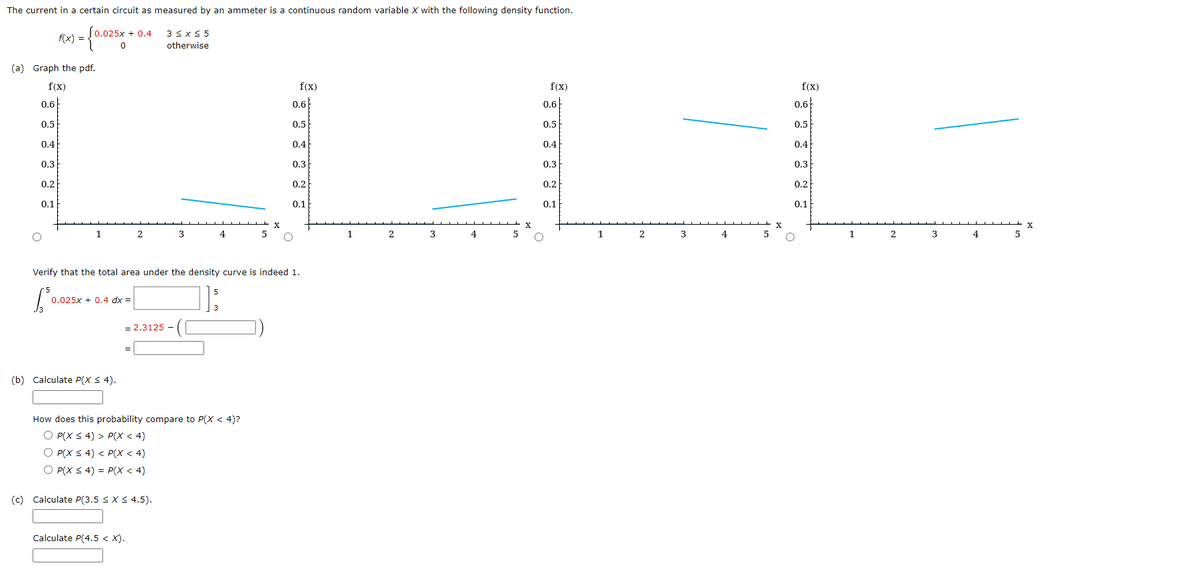The current in a certain circuit as measured by an ammeter is a continuous random variable X with the following density function. (x) = {0.025x + 0.4 3 ≤x≤5 0 otherwise (a) Graph the pdf. f(x) f(x) f(x) 0.6 0.5 0.4 0.3 0.2 0.1 1 2 O 3 4 5 O 3 Verify that the total area under the density curve is indeed 1. 0.025 0.025x + 0.4 dx= 3 = 2.3125 - =( (b) Calculate P(X ≤ 4). How does this probability compare to P(X < 4)? O P(X ≤4) > P(X < 4) O P(X ≤ 4) < P(X < 4) OP(XS 4) = P(X < 4) (c) Calculate P(3.5 ≤ x ≤ 4.5). Calculate P(4.5 < X). 0.6 0.5 0.4 0.3 0.2 0.1 0.6 0.5 0.4 0.3 0.2 0.1 1 2 4 5 X O 1 2 3 4 X f(x) 0.6 0.5 0.4 0.3 0.2 0.1 O 1 2 3 4 X
The current in a certain circuit as measured by an ammeter is a continuous random variable X with the following density function. (x) = {0.025x + 0.4 3 ≤x≤5 0 otherwise (a) Graph the pdf. f(x) f(x) f(x) 0.6 0.5 0.4 0.3 0.2 0.1 1 2 O 3 4 5 O 3 Verify that the total area under the density curve is indeed 1. 0.025 0.025x + 0.4 dx= 3 = 2.3125 - =( (b) Calculate P(X ≤ 4). How does this probability compare to P(X < 4)? O P(X ≤4) > P(X < 4) O P(X ≤ 4) < P(X < 4) OP(XS 4) = P(X < 4) (c) Calculate P(3.5 ≤ x ≤ 4.5). Calculate P(4.5 < X). 0.6 0.5 0.4 0.3 0.2 0.1 0.6 0.5 0.4 0.3 0.2 0.1 1 2 4 5 X O 1 2 3 4 X f(x) 0.6 0.5 0.4 0.3 0.2 0.1 O 1 2 3 4 X
A First Course in Probability (10th Edition)
10th Edition
ISBN:9780134753119
Author:Sheldon Ross
Publisher:Sheldon Ross
Chapter1: Combinatorial Analysis
Section: Chapter Questions
Problem 1.1P: a. How many different 7-place license plates are possible if the first 2 places are for letters and...
Related questions
Question

Transcribed Image Text:The current in a certain circuit as measured by an ammeter is a continuous random variable X with the following density function.
3 ≤ x ≤ 5
f(x) =
0.025x + 0.4
0
otherwise
(a) Graph the pdf.
f(x)
f(x)
f(x)
0.6
0.6
0.5
0.5
0.4
0.4
0.3
0.3
0.2
0.2
0.1
0.1
1
2
3
4
5
3
Verify that the total area under the density curve is indeed 1.
150.
0.025x + 0.4 dx =
= 2.3125
(b) Calculate P(X ≤ 4).
How does this probability compare to P(X < 4)?
O P(X ≤ 4) > P(X < 4)
O P(X ≤ 4) < P(X < 4)
O P(X ≤ 4) = P(X < 4)
(c) Calculate P(3.5 ≤X ≤ 4.5).
Calculate P(4.5 < X).
=
X
1
4
0.6
0.5
0.4
0.3
0.2
0.1
O
1
2
3
4
X
f(x)
0.6
0.5
0.4
0.3
0.2
0.1
O
1
2
3
4
Expert Solution
This question has been solved!
Explore an expertly crafted, step-by-step solution for a thorough understanding of key concepts.
This is a popular solution!
Trending now
This is a popular solution!
Step by step
Solved in 5 steps with 4 images

Recommended textbooks for you

A First Course in Probability (10th Edition)
Probability
ISBN:
9780134753119
Author:
Sheldon Ross
Publisher:
PEARSON


A First Course in Probability (10th Edition)
Probability
ISBN:
9780134753119
Author:
Sheldon Ross
Publisher:
PEARSON
